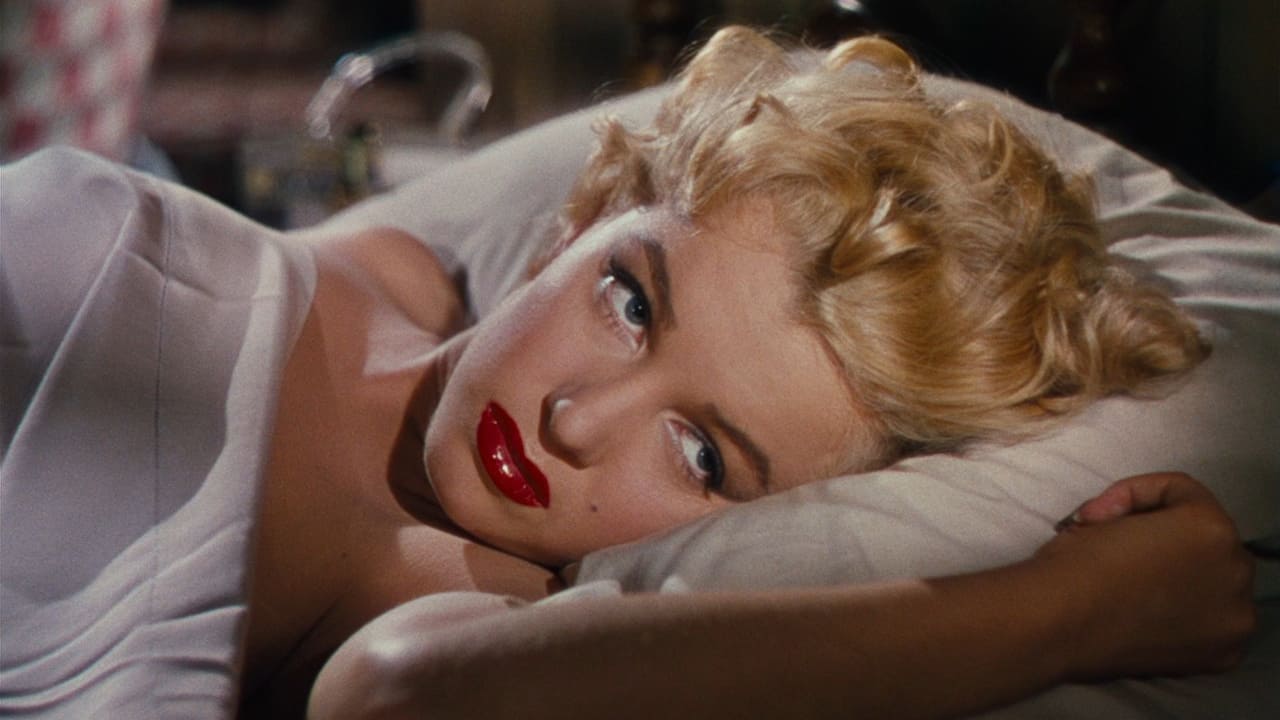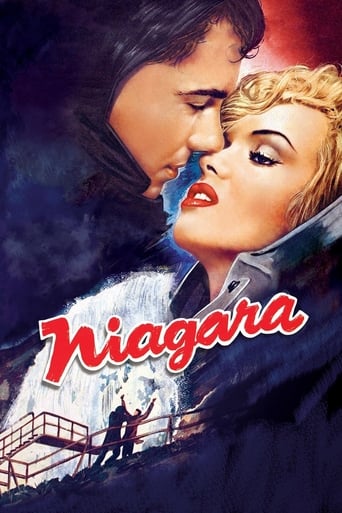

Save your money for something good and enjoyable
... View MoreJust intense enough to provide a much-needed diversion, just lightweight enough to make you forget about it soon after it’s over. It’s not exactly “good,” per se, but it does what it sets out to do in terms of putting us on edge, which makes it … successful?
... View MoreThe plot isn't so bad, but the pace of storytelling is too slow which makes people bored. Certain moments are so obvious and unnecessary for the main plot. I would've fast-forwarded those moments if it was an online streaming. The ending looks like implying a sequel, not sure if this movie will get one
... View MoreOne of the most extraordinary films you will see this year. Take that as you want.
... View MoreWhy would the politicians of Niagara Falls (Canada) speak against this film at the time of its release when it depicted their city, especially the magnificent, natural wonder at its core, in such a flattering light? Although I haven't visited the falls since 1951, just before this film was produced, whenever I see this wonderful movie, I have an urge to go again, this time not as a two year old.I'm also very disappointed by the many mediocre and negative recent IMDb user reviews of this film, which was a great achievement by both director Henry Hathaway and cinematographer Joe McDonald. The performances by Joseph Cotten and Jean Peters were especially good. The one very noticeable flaw was in the writing, specifically the insufficient background information behind the character of George Loomis (Cotten). He was apparently a combat veteran of the Korean War, but I would have appreciated more details about his war experience and how he developed his condition, which was apparently PTSD, a wartime malady that was not diagnosed as such at the time. For me, George Loomis represented one more disregarded Korean War veteran. Tragically, there were many others in real life.While Marilyn Monroe's acting may not have been the greatest in this film, her very presence was captivating. The scene of her singing the theme song "Kiss" in her magenta colored dress was so sublime and beautiful that I will think of it very fondly for the rest of my days. And how many times did Hathaway have her walk away from the camera for prolonged periods? I counted four, but I'm not sure that I was thinking clearly enough to count accurately at the time. For a character who should not have been very sympathetic, Rose Loomis made quite an impression on me. And those silent, still bells in the carillon conveyed a deafening message just at the right moment. As he did in another favorite film of mine, Hitchcock's "Shadow of a Doubt", Joseph Cotten successfully played a very dismal, gloomy character. This time, however, he didn't attempt to conceal his deep, internal darkness from a very gullible, imperceptive and even foolish world as he did in Hitchcock's film. His seemingly innocent conversation with Polly Cutler (Peters) at the beginning serves as a a noteworthy premonition of events to follow. Another, even more subtle message is conveyed when Rose's shadow interferes with the photo that Ray Cutler was attempting to take of his wife. Another ominous sign of what will come.While many reviewers did not appreciate Max Showalter's (Casey Adams') character as Ray Cutler, these "happy go lucky" people were far more common in 1953 when times, in many ways, were happier and more go lucky, especially when the Korean War was finally brought to a close, as inconclusive as that was. Showalter (Adams) has over 100 movie and television credits under his belt, so somebody else must have liked him too, at least back in those days of yore, which were my days. I'm sorry that more reviewers did not appreciate "Niagara" as the great film that I believe it is. The sensational cinematography, especially of the falls, the unique and dramatic atmosphere created by the director, the excellent performances of both Cotten and Peters, and the stunning beauty of Marilyn Monroe keeps this on my list of favorites.
... View MoreNiagara Falls was beautiful in this movie, and the movie had an attention-holding plot, but the actors simply did little more than say their lines. Marilyn Monroe was the same sex symbol she always was, but her acting was not outstanding. Jean Peters herself was low-keyed. And while you were not impressed with the type character Joseph Cotton portrayed, at least he did put himself into his role. Henry Hathaway was always a superb director, but this would not rank among his top movies I dare say. Still, the scenery, which included Niagara Falls and the surroundings on the Canadian side, were definitely what pulled people to see it. Again, beautiful scenery, tense story, but not-so-great acting.
... View MoreRose Loomis (Marilyn Monroe) takes a trip to Niagara Falls with her husband George Loomis (Joseph Cotton) as part of their honeymoon. Rose hatches a plan to murder her husband with her lover's help, but things don't go according to plan.This really should have worked as it has a very simple 'Hitchcock type' plot, but sadly it always feels much less than the sum of its parts. The first problem with this film lies with the screenplay which is very basic and never offers anything in the way of surprises or suspense at any point in the film (and believe me there were lots of missed opportunities in this respect). The film also takes an awful long time to get going (why it does this when the plot is simple and straight-forward is anyone's guess).The characterisation here is rather poor and motivation is also rather weak - this ultimately results in a story and characters that I didn't particularly care about. The narrative involves Polly & Ray Cutler as the concerned fellow holidaymakers who both come across as very twee and fake in the early stages (Polly develops and improves somewhat in the second half of the film), but Ray remains the same throughout the film and felt to me more like a caricature than a real person. One thing I will concede is that the Cutler's romance was convincing, but in a sort of nauseating way.The performances are variable with only Joseph Cotton and Jean Peters making any real impression on the film; Marilyn Monroe looks great, but isn't particularly convincing and the less said about Max Showalter the better.Aside from a couple of good performances the only other thing that I liked about this film was the on-set locations and cinematography, but in all honesty Niagara just isn't very good and after watching it I just kept thinking to myself 'What would this film have been like if Hitchcock was at the helm?'
... View MoreHenry Hathaway has directed a melodrama involving a perfectly normal honeymooning couple (Peters and Showalter) trying to help a troubled couple (Cotton and Monroe) of the kind that marriage counselors call unstable and unsatisfactory.Cotton has just been released from some kind of booby hatch and we take his obsessive paranoia about his wife's fidelity as symptomatic, but in fact he's quite right. Monroe has a lover. They plan to murder Cotton and take off for Chicago.Monroe and her paramour use a vapid pop song that they arrange to have played by the bells in the campanile as a signal for them to meet and fornicate like two aardvarks in heat. The insipid love song may have been meant for public release, maybe sung by Patti Page or someone, but it never leaves the ground. "It's the ONLY song," breathes Monroe. If that were the case the end of civilization would be at hand.But if the song flops, Monroe does not. Hathaway and the studio have lavished as much attention on her as her lover has. She's dressed in startling vermilion dresses, she's festooned with diamonds, and her lips are a glistening scarlet that might blind a companion in a dark room. When she delivers a line her upper lip droops for a second over her lower, as if getting ready to do something entirely on its own.She wears spaghetti shoes. She wears false eyelashes, make up, and that polished lipstick. She wears it in the shower. She wears it while lying unconscious on a hospital bed. And when she walks away from the camera, the shot lingers forever on her undulating rear.Peters and Showalter are anxious to help the tortured couple but Peters discovers some shadowy nooks in the others' marriage and when she tries to tell her husband she dissolves into hysterical gibberish so that an irritated Max tells her to "Stop it now; it was all just a bad dream!" The last third of the picture is more kinetic. There are lots of pursuits, always upward. Frightened people climb rickety wooden staircases that seem to meander through the dripping rocks. People are trapped in stone grottoes, left hanging to small rocks in the St. Lawrence River. And way high up in the campanile, the bells provide silent witness to murder.It's Marilyn Monroe's picture all the way.
... View More